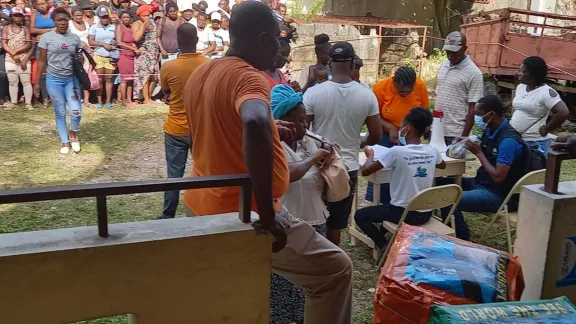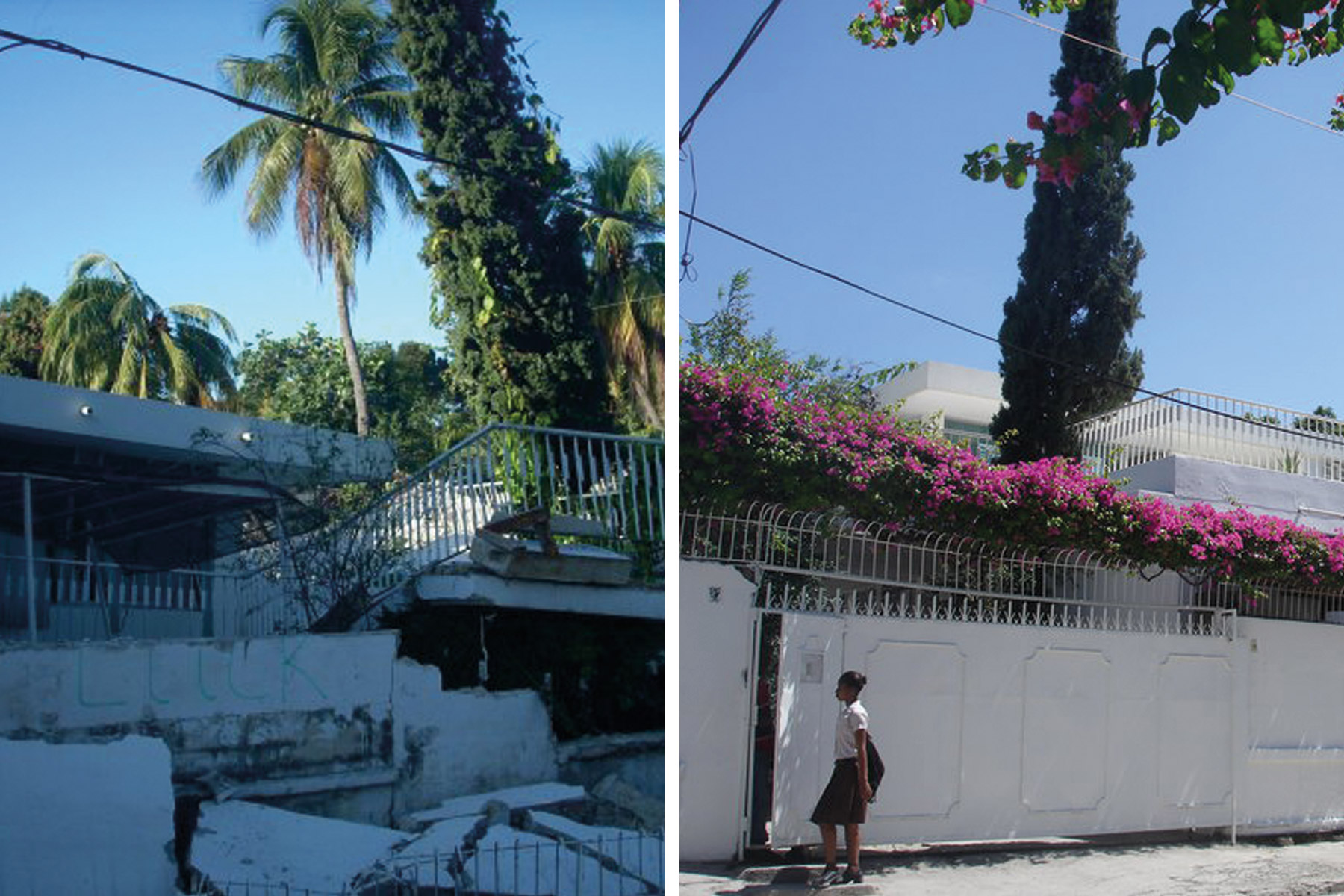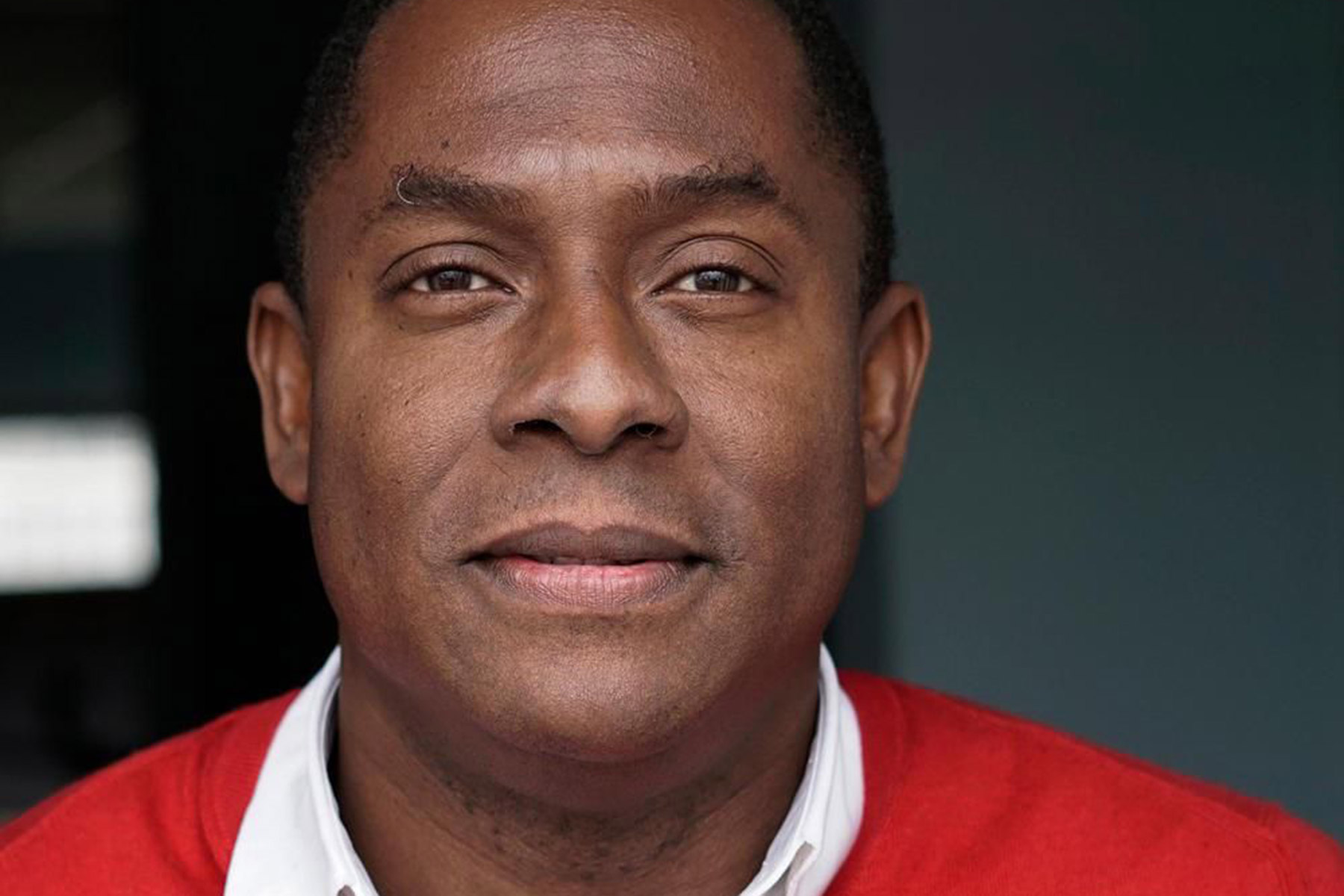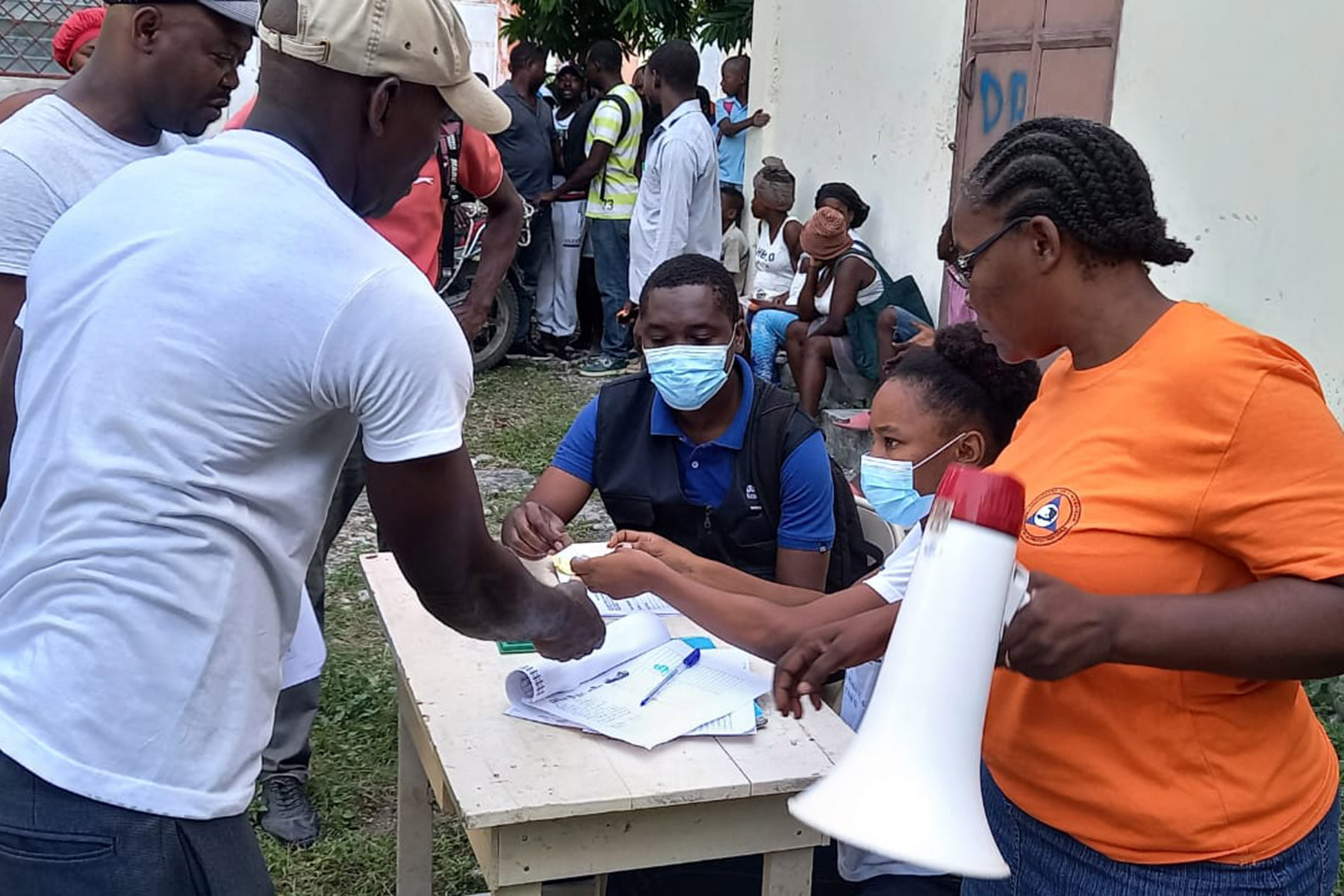
DKH/LWF/NCA office staff distribute emergency shelter kits for 300 families in Camp Perrin in the south of Haiti. Photo: DKH
The last in our World Humanitarian Day series brings personal testimony from LWF’s program director in Haiti
(LWI) - On the morning of Saturday 14 August, Prospery Raymond, director of the Lutheran World Federation (LWF) country program in Haiti, was driving in his car when he felt the vehicle lurch and worried that he might have some serious engine trouble. Seconds later, his daughter rang to say that the shaking was caused by a 7.2 magnitude earthquake that had hit the south of the Caribbean island nation. The humanitarian worker had an instant flashback to 2010, when he was buried under the rubble of another quake that killed over 200,000 people and levelled large parts of the capital, Port-au-Prince.
Eleven years on, Raymond clearly remembers that January day when he was working as the Caribbean regional country director for Christian Aid and was on a Skype call to colleagues in Jamaica. “I felt the first tremor and instinctively moved to the corner of the room,” he recalls. “I watched the roof fall onto my desk and knew that if I’d stayed there a few seconds longer, I would have died,” he says. As the office collapsed around him, he was trapped for two hours under the rubble, before being dug out by local youths who had heard his desperate cries for help.

The Christian Aid office in Port-au-Prince, where Raymond’s office was located, showing the building before and after the 2010 earthquake. Photo: Christian Aid
It was a terrifying experience that left him with nightmares, long after the disaster which made over a million and a half people homeless in less than a minute. Unlike the 300,000 severely injured, he suffered only minor damage to one knee, but needed a lot of psychological support to treat the mental health consequences. Reflecting on the needs of survivors following the latest quake, he says: “I can feel their devastation, I can feel what people are thinking, as they wonder what the next chapter of their lives will be.”
Coordinated emergency response
On this occasion too, Raymond was lucky to survive: two days earlier, the native of Les Cayes had been visiting the south-western peninsula, staying in a hotel that collapsed during the quake. “Both the Catholic churches, where I was baptized and received my First Communion were heavily damaged and my grandmother’s house was completely destroyed,” he says. His own family survived and found shelter, but he lost friends in both this and the 2010 earthquakes.

Prospery Raymond, director of the Lutheran World Federation (LWF) country program in Haiti. Photo: Christian Aid
Within minutes of the latest disaster, Raymond began activating LWF’s emergency response in close coordination with colleagues from Norwegian Church Aid (NCA) and the German Protestant relief agency Diakonie Katastrophenhilfe (DKH). The three organizations cooperate through a joint program in Haiti to share resources and reduce costs, in a country that ranks as the poorest in the northern hemisphere.
Working in Haiti since 1995, the LWF program has been supporting those worst affected by the 2010 earthquake, as well as by the 2016 Hurricane Matthew which devastated large areas in the south-east of the island. Partnering with the Haitian government, local civil society organizations and the ACT Haiti Forum, the program focuses on building new houses and training people in disaster preparedness, as well as on reforestation and food production.
Shelter, protection, sanitation
Situated in a hurricane corridor and on a continental rift, the country is prone to natural disasters but Raymond says that climate change is causing worse storms and more unpredictable weather patterns, including increased droughts and flooding. Roads, bridges, schools, hospitals and other public buildings have been badly damaged in the latest quake which has killed close to 2,200 people.
Eight days after the disaster, Raymond says a further 24 people were found alive under the rubble, including four children. “The area is still reeling from more than 500 aftershocks – some as strong as the original quake – that make it hard for the rescue efforts,” he says. Just two days after the earthquake, Tropical Storm Grace caused further problems for the 650,000 people needing emergency assistance and shelter from the heavy rains.

DKH/LWF/NCA office staff register earthquake survivors at Camp Perrin in the south of Haiti. Photo: DKH
“The first steps we took were to gather information, to advise people about where to find shelter and protection,” Raymond continues. “Now we urgently need money to rebuild water and sanitation facilities and to distribute hygiene kits,” he says, recalling the cholera outbreak that killed over 8,000 people following the 2010 earthquake. “We have a truck with water filters, a specialized WASH (water, sanitation and hygiene) team and people working in the worst affected communities, many in remote mountain areas, fixing broken water systems,” he adds.
Preventing gender-based violence is another part of the joint emergency response, since vulnerable women and girls face increased risks following all such natural disasters. “We work to inform people of the risks, to mitigate by reducing proximity and setting up separate toilets for women,” Raymond notes. “It is also important to sensitize people to this issue and let them know how to respond, if necessary,” he says.
Our work offers hope and dignity, to empower people and to show how we can live out our faith through action.
In the longer term, funds are urgently needed to start building houses to replace the 80,000 homes that were damaged or destroyed by the quake. “Some people are desperately trying to patch up their houses, but they run the risk of the buildings collapsing on them,” Raymond says. Basic building costs start from around US$5,000 per house, but “the good news is that we trained many masons after previous disasters and are better prepared to obtain the necessary government permits,” he explains.
"So much can be done if we receive the necessary resources,” Raymond insists, adding that he hopes the country and the international community have learnt lessons from the 2010 tragedy. He notes the need for “much better coordination and planning, with fewer actors and more resources going to local organizations and to the Haitian government.”
There is a strong sense of solidarity among Haitians themselves, Raymond says, with many people responding to a call for blood donations to treat the injured. “I’m a donor myself and I’ve been encouraging others as well. It’s the least we can do to help those in need – Haitians helping Haitians, not just relying on help from outside,” he adds.
Yet there is a huge need for financial resources to support organizations like LWF/NCA/DKH, both for the ongoing emergency response and for the long-term work of rebuilding homes and livelihoods. “Donations are really important to us,” Raymond says, “as they will make a real difference to people’s lives.” Right now, “people are scared and I often feel scared too,” he concludes. “But our work offers hope and dignity, to empower people and to show how we can live out our faith through action.”
LWF/P. Hitchen
Throughout August, Lutheran World Information is featuring interviews with humanitarian workers contributing to LWF’s emergency and development work worldwide.
World Humanitarian Day is observed each year on 19 August to honor humanitarian aid workers, including United Nations and other personnel, who are committed to the service of the world’s most vulnerable people and communities. It marks the day on which the former UN Special Representative of the Secretary General to Iraq, Sérgio Vieira de Mello, and 21 of his colleagues were killed in the bombing of the UN headquarters in Baghdad in 2003.


